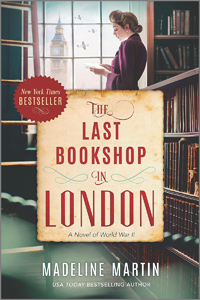Book nerdery and the Nazis’ nightly bombing of London in World War II would seem to go together like orange juice and pickles. But Madeline Martin melds them together for a incongruously light and enjoyable novel of historical fiction, “The Last Bookshop in London” (2021).
Maybe this isn’t exactly chocolate and peanut butter. But Martin makes an effective case that one’s love of books can help them through a tough time, while simultaneously not trivializing the tough time. It’s a delicate endeavor, because no one can say with a straight face that a person’s love for “The Count of Monte Cristo” is an equivalent happiness to the devastation of losing a son in WWII.
Martin pulls off the high-wire act because “Last Bookshop” is written in the tone and style of a “Harry Potter” novel, only without the magic, as it’s set during one of the grimmest times in Western civilization.

“The Last Bookshop in London” (2021)
Author: Madeline Martin
Genre: Historical fiction
Setting: London, during World War II
Note to readers: The Book Club Book Report series features books I’m reading for my book club, Brilliant Bookworms.
The publisher decided to not market it as young adult, but the prose, character arcs and situations are simple. Everything is universally relatable, and the scenarios play out like you’d assume; the author never undercuts a cliché or adds second layers of meaning.
So I maybe didn’t fall deeply in love with “Last Bookshop” – totally smitten and waiting for the postman to deliver letters censored by the war office – but I love the novel like a cuddly pet. Martin’s heart is in the right place as she invents Grace, a country girl who had been living with borderline-miserable relatives (again, a “Potter” parallel).
A touch of Grace in trying times
Entering her 20s, Grace moves in with her late mom’s friend, Mrs. Weatherford, in a London townhouse. Joining her is bestie Viv, upbeat and fashionably put-together; perfect for a job at Harrod’s department store. Grace settles for an assistant gig at Primrose Hill Books, owned by Mr. Evans, who would be played by a curmudgeonly white-bearded actor with spectacles sliding down his face if this was a movie.
Martin finds the simplicity of the bygone era of shopping and communication endearing, but her heart belongs to bookstores. If novel writing was a popularity contest, she’d be cheating with “Last Bookshop,” because most readers love reading.
On the other hand, that means the bar is high for Martin communicating that love. She mostly does, starting when handsome customer George learns that Grace has never read a book (!) and recommends “The Count of Monte Cristo.” She loves it, and her life as a book lover is off and running.
Martin gives equal word count to horrific tales of the bombings as Grace volunteers for a second job as a patroller who makes sure people’s lights are out during blackouts (darkness makes it harder for German pilots). She helps people get to shelters when the air-raid sirens go off, and — most harrowingly — helps in the cleanup and rescue efforts.

In one segment, the author mentions that rescue vehicles struggle through the streets because body parts must be moved out of the way. But overall, “Last Bookshop” isn’t gory. While it holds back on the visceral horror, it does communicate citizens’ anxiety – as well as the notion that humans can adjust to anything. People start ignoring the air-raid sirens because they’d rather sleep in their own beds.
The sanctuary of stories
The idea that Grace’s readings at Primrose Hill Books draw Londoners who need a mental escape is catnip to book lovers. Martin perhaps could’ve done more to draw parallels between the novels Grace is reading and real-life situations. Then again, maybe it’s important that Grace doesn’t let the war determine her selections, even though “What Hitler Wants” is among the store’s top sellers.
The new bride’s struggle with marriage in “Rebecca” is trivial compared to Blitz horrors, but if Grace desires an “escape” into that story, who am I to judge?
“Last Bookshop” may be a totally safe book. The evil of Nazis is communicated only through the bluntness of their actions, not through any bigger picture or comparisons with the Allies. Indeed, she notes that the Allies are bombing Germany, too, and never mentions the Holocaust.
But it also tells universal, emotional truths via Grace and other people we like. To criticize “The Last Bookshop in London” would be like complaining that a loyal pet isn’t doing enough to help out around the house.

